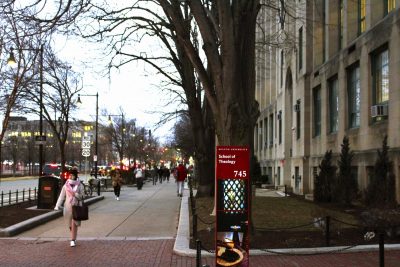
The Boston University Cross-Disability Club at the School of Theology held an accessibility walk Wednesday to show able-bodied members of the BU community the challenges their disabled peers face in getting around campus.
The walk was led by club founder Elizabeth Foster, a second-year graduate student in the School of Theology. It began in Marsh Chapel and ended in the School of Theology.
Foster, who uses a rollator, a type of walker, as a mobility aid, showed participants the longer-than-average walk she must take to get from one building to the other.
She first exited the Marsh Chapel by the side door that is closest to the School of Theology — the only accessible entrance to the chapel — and used a lift to descend the first set of stairs. The only accessible entrance to the Theology building is in the back and requires the use of another set of stairs, for which there is no ramp.
Foster then led the group on a nearly full-circle loop around Marsh Chapel, since the only ramp to get to the walkway behind these buildings is between the chapel and the College of Arts and Sciences. She stopped just before the ramp to the Theology building to thank participants for coming and to encourage them to apply what they had learned to their day-to-day life at BU.
“If you’re in a club, make sure all of your events take place in accessible spaces on campus and that everyone’s communication needs are met,” Foster said. “And no matter who you are, please reach out to BU administration and ask them to commit to making our campus more accessible.”
BU spokesperson Colin Riley said that issues of accessibility come naturally with an urban campus, but that the university is focusing on improving accessibility with each new construction project.
“Whenever you have a campus where there is a lot of construction and a lot of pedestrian and vehicular traffic there are [accessibility] issues,” Riley said.
He said that much of the campus infrastructure is aging and needs improvement.
The Cross-Disability Club was founded this semester by Foster to create a community for students with disabilities who want to work on accessibility issues on campus. Although the club originated in STH, many students from other schools, both graduate and undergraduate, have joined the club after finding a lack of such a community elsewhere on campus, Foster said.
Foster said she organized the walk not only to show able-bodied people her round-about route to class, but also to expose other challenges faced by students with mobility disabilities. One of those challenges is the requirement that students physically go to the Disability and Access Services office to get approval for official accommodations, which Foster said she finds counterintuitive.
Sarah Harbaugh, a second-year graduate student in STH, said she participated in the walk to support her friends who have disabilities and BU should be doing more work to listen to their concerns.
“Being aware of people with disabilities and being in communication with them about letting them articulate what they need is really important,” Harbaugh said. “I, as an able-bodied person, don’t pretend to know everything that they need and everything that could help them.”
Triss Ingels, a fourth-year graduate student in STH who attended the walk, said she recognized the privilege she has in not having to think about issues of accessibility.
“As an able-bodied person, I take a lot of things for granted,” Ingels said, “such as just walking up and down stairs and being able to follow this path with friends and colleagues.”
Martha Schick, a second-year graduate student in STH, said she attended the event to support friends, but also to act as a model for other able-bodied students.
“This walk felt like something important that I, as an able-bodied person, should do to try to understand more what Elizabeth and other students deal with,” Schick said, “and also be a physical presence so that people can see that this should be a concern for all students, not just students that this directly applies to.”
Correction: A previous version of this article referred to the students in the School of Theology as undergraduates, but they are all graduate students. The current version reflects these changes.



















































































































Jeremy (not Schulz) • Nov 18, 2019 at 12:17 pm
I was similarly confused by the way this reporter referred to STH students by terms such as “sophomore” and “senior”. Not sure if that’s really how the students identified themselves or if it was the reporter’s mistake. In any case STH does not have any undergraduate degree programs (to the best of my knowledge).
Jeremy Schulz • Nov 18, 2019 at 8:30 am
These are all graduate students. STH is a graduate school. Please take the time to genuinely listen to people you interview, so that you represent them as they truly are. Please update this article to reflect the identities of those interviewed.
Jane Wilson • Nov 15, 2019 at 2:51 pm
Accessibility and accessing such in first place is challenging in Boston!!!